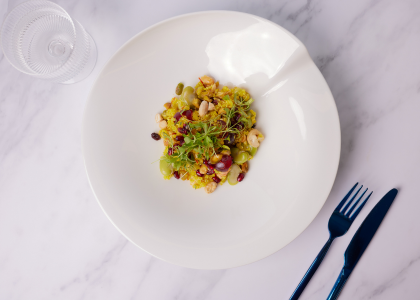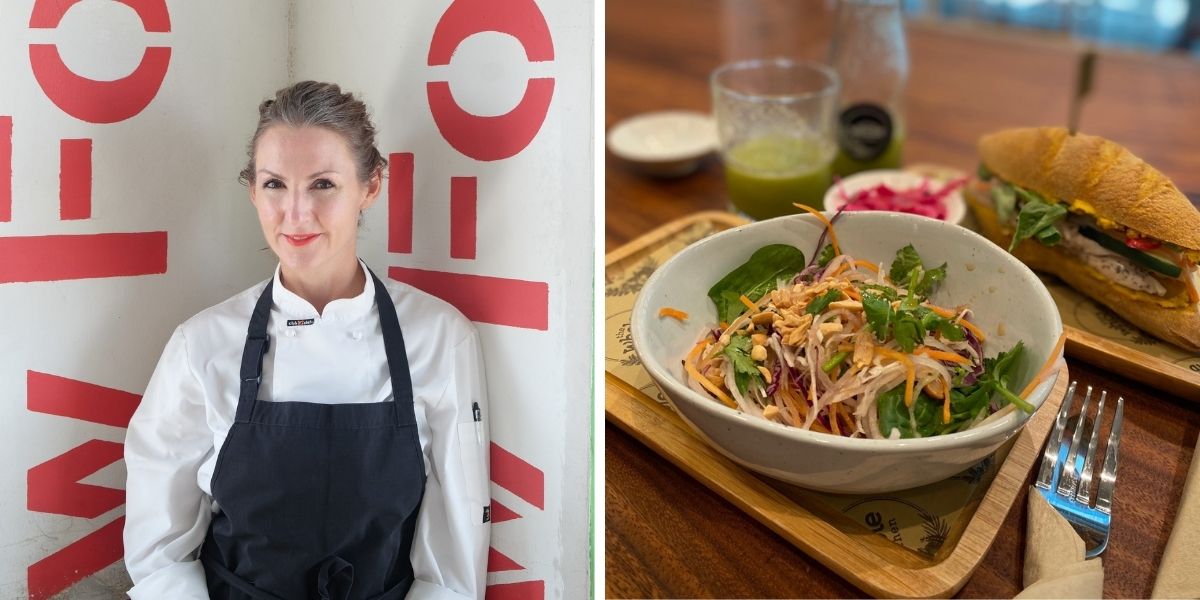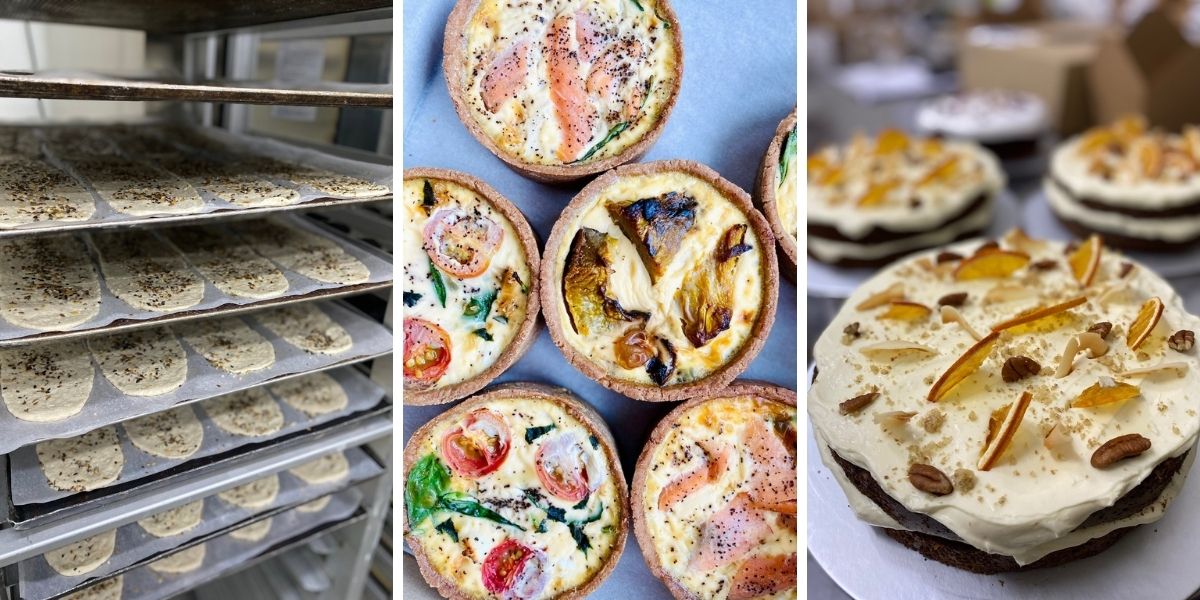
A plant-based recipe to celebrate great chefs around the world
This International Chef's Day, we're raising a fork to the hard-working and passionate chefs across the world, including Le Cordon Bleu chefs in training, ...
 Images: Susan Soulard, @The_WholeKitchen
Images: Susan Soulard, @The_WholeKitchen
Susan Soulard is a chef, food business leader and Co-Founder of The Whole Kitchen in Singapore. With over 20 years’ experience in the food and beverage industry, discover Susan’s culinary journey and recent experience studying Plant-Based Diets: Nutrition and Wellness with Le Cordon Bleu Online Learning.
When I was 20 years old, I moved into the culinary field and trained as a chef. I worked in kitchens around the world for over 10 years, where I ended up in London. I was working 80–90-hour weeks in a London restaurant and it started to take its toll. It was a great time, but it wasn’t sustainable long term. I decided to go home to Australia, where I began to work more on the food and beverage business side of things at some of Sydney’s highest calibre restaurants, such as Catalina Rose Bay and Quay Restaurant. I also managed the overall food account at Google Australia’s headquarters, designing new kitchens and keeping up with the immense growth at Google.
I was always drawn to Singapore and the opportunities there. So, I gave myself 12 months off to adjust to being a new mum and moved to Singapore. I had the opportunity to run an international school food program in between having two kids. It was the hardest job I have ever done as I was managing different cultures, religions, and age groups. Being a female expat was very challenging, but it was amazing, and I learned a lot.
After having children, I felt I was ready to branch out and be my own boss. I knew I was a hard worker. I wanted to make changes and do good things. At this point in my life, I was ready to control my own time. That’s when I met my business partner, and we began The Whole Kitchen.
The Whole Kitchen is an artisanal bakery which focuses on all natural ingredients. We cater to those looking for gluten free, low sugar, nutritious and flavoursome baked goods. Our products are down-to-earth and have no preservatives. I have always been into healthy food and healthy living. Especially being accustomed to cafes and restaurants in Australia, which are full of salads and healthy options with various cultural influences, such as Asian and Italian. Singapore used to be very limited with options like these as an everyday food. The cafes were more focused on rainbow cakes instead of healthy eating. My business partner, who is from an FMCG background, is also really into fitness and healthy eating. So, we thought we should give something a go which caters to this market.
The Whole Kitchen started in 2015 as a shared kitchen, when the scene in Singapore was quite different. Singapore is now the melting pot of cuisine. It has hawker stalls, fine dining restaurants, three hats, medium bistros to bars, and bakeries.
It didn’t take long until we were ready to invest in a full factory. We now have a 200m factory space and we have been here for around six years. Since then, we’ve started specialising in wholesale gluten free goods. We have a lot of other healthy eating programs as well, as there is no ‘one size fits all’ diet.
We have grown to specialise in bread, which is more than 50% of our product range. Bread is in production 6-7 days a week and we’re making hundreds of thousands of kilos of dough. We also do gluten free cakes, pastries, cookies, and biscuits. The Whole Kitchen also has seasonal ranges, nut mixes and granolas. We’ve really developed our everyday living cuisine and pantry items that you can add yogurts and fresh fruits to. The Whole Kitchen now has two new cafes, a neighbourhood cafe which launched in 2020, and a newly launched upmarket cafe in the CBD. Images: Susan Soulard, @The_WholeKitchen
Images: Susan Soulard, @The_WholeKitchen
I chose to study with Le Cordon Bleu because it’s one of the top culinary educators in the world. Le Cordon Bleu is global and renowned. The course choices are very broad from a culinary perspective, very specialised as well.
Since COVID started at the beginning of 2020, I wanted to take the opportunity to upskill. There are so many resources online now that you don’t have to physically attend classes to undertake a course.
I studied Plant-Based Diets: Nutrition & Wellness. It was the very first online course I have ever done, and I really liked it. It worked well with my schedule as I was working full time whilst doing the course. We used to meet online every Tuesday afternoon and I could do the course from work, from home or wherever I was. I only missed one out of 16 weeks, so it was quite good because I could keep up with everything. There was two or three assignments and they tested me a bit, but not so much that it stressed me out. The assignment topics covered the role and sustainability in society of; Gluten Free Alternatives, Plant Based Proteins and Nutrition Powerhouses.
The reason why I wanted to do the Plant-Based Diets course is to get a broader understanding on the food industry. The course focused a lot on the supply chain. I also really enjoyed learning about agriculture, growing food, the farm to the plate, composting, meats, and vegetables. We explored different perspectives and looked at plant-based diets, which influenced me to question my own perspective and the industry perspectives on what is healthy and what isn’t healthy.
The course was very high calibre. The content was delivered in a very professional yet friendly manner by the lecturer, Samantha Gowing. She was amazing and I related to her background because she is very broad in terms of what she has done; I am a bit of a jack of all trades as well. At the end of the course, Sam and I gifted each other our branded products. I gave her some TWK, as sense of gratitude for her knowledge. Sam shared her Black Betty Jam condiments with me - which have the same flavour profiles as the much loved Vegemite!
I found the course materials, the professionalism, and the level of communication very good. Working through the dashboard and the website was very accessible and user friendly. It also covered different backgrounds and networking opportunities. I still follow a lot of people from the course on social media which is great, and we keep in touch on the side.
The course allowed me to explore plant-based diets from a more informed perspective. Plant-based meats and cultivated meats is quite big in Singapore, so it was great to gain an in-depth understanding on the industry. We are happy that the Whole Kitchen is more wholefoods rather than highly processed meat or alternative meat, using raw materials and very minimally processed foods. The 'alternative protein' industry in Singapore is attracting serious investment, yet The Whole Kitchen remains at the root of the wholefoods movement and natural premium ingredients using amazing fresh unique flavours.
I definitely recommend Le Cordon Bleu Online Learning to anybody – I’m even looking to study again with Le Cordon Bleu this year!

Copyright © 2026 Le Cordon Bleu International B.V. All Rights Reserved.